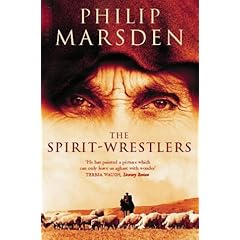The finest travel writer
 I first became aware of Philip Marsden’s travel writing when I read ‘The Crossing Place’, his nuanced journey examining Armenian history and identity. I've enjoyed re-establishing the acquaintance, having got my hands on Marsden’s ‘Spirit Wrestlers’, an account of his travels in southern Russia and the Caucasus, examining the ethnicities and religious sects who subsist in that region.
I first became aware of Philip Marsden’s travel writing when I read ‘The Crossing Place’, his nuanced journey examining Armenian history and identity. I've enjoyed re-establishing the acquaintance, having got my hands on Marsden’s ‘Spirit Wrestlers’, an account of his travels in southern Russia and the Caucasus, examining the ethnicities and religious sects who subsist in that region. The book is ten years old, but it is particularly relevant given recent problems in areas the author visits. Marsden actually travels through South Ossetia, living with a local doctor named Pushkin and meeting the breakaway republic’s president, on his way to 'Georgia proper'. Even discounting contemporary relevance, it is simply a joy to read writing of the calibre Marsden produces. His prose is rich, nuanced, perfect in pitch and tone. It makes me profoundly jealous.
He shares none of the cynicism which characterised Daniel Kalder’s account of travelling in Russia’s ethnic republics, which I praised with qualification on this blog. Marsden has endless empathy and regard for the people and cultures which he encounters. Neither is he as flowery as Colin Thubron. He writes with lyricism and poetry, but does not waste a word. There are no dubious analogies or fanciful metaphors in Marsden’s work. Everything is precise.
The subject matter is also fascinating. The ‘Spirit Wrestlers’ of the title are Doukhobors, a radical Christian sect who were shunted around southern Russia and exiled to the Transcaucasus. The author visits Molokans (or milk drinkers), Kuban Cossacks, Zaporozhians and Yezidis, who were demonised as devil worshippers due to their reverence for a fallen angel. His journey takes him from the mighty Don river, through the Russian Caucasus and finally into Georgia and Armenia.
This is travel literature at its very best. You are unlikely to read any better travel writer than Philip Marsden.
Comments
nike sb dunks
offwhite
stephen curry shoes
balenciaga shoes
curry 6
nike lebron 16
supreme clothing
off-white
golden goose